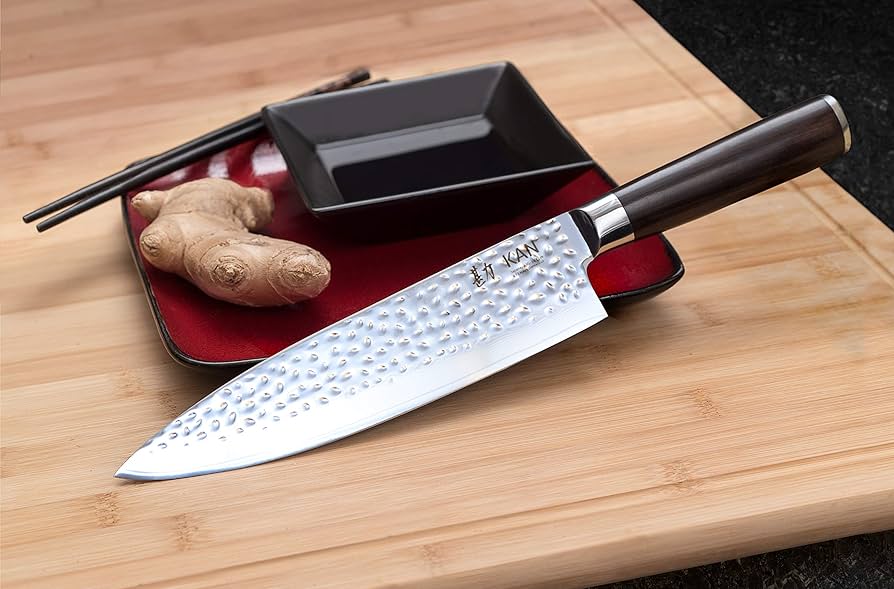The allure of handmade Damascus knives from Pakistan lies not only in their aesthetic appeal but also in their rich historical legacy and superior craftsmanship. These exquisite knives, renowned for their durability and beautiful patterns, have captured the imagination of kitchen professionals and culinary artists around the world.
Originating from the legendary Damascus steel used in swords during the Middle Ages, Pakistan’s tradition of crafting these knives continues to thrive. The intricate designs, combined with exceptional strength, make these knives a popular choice for chefs and cooking enthusiasts.

What Are Handmade Damascus Knives?
Handmade Damascus knives are crafted from Damascus steel, which is known for its distinctive wavy patterns. This pattern is the result of forging and folding the steel multiple timesan art that requires skill and patience. The knives are a symbol of mastery in metallurgy, blending cutting-edge technology with traditional techniques.
The Rich History of Damascus Steel
To truly appreciate handmade Damascus knives from Pakistan, one must understand the history of Damascus steel. Originating in the Near East, its composition was a mystery for centuries. Ancient craftsmen in India, known for their wootz steel, laid the groundwork for what would become Damascus steel. Learn more about Damascus steel’s history.
Why Pakistan?
Pakistan has become a prominent center for creating these knives, thanks to its skilled artisans who have mastered the age-old techniques. The region offers high-quality materials and rich cultural heritage, making it an ideal place for nurturing this craft. Factories in cities like Wazirabad and Sialkot are renowned for producing world-class Damascus knives.
The Craftsmanship Behind the Blades
Crafting handmade Damascus knives from Pakistan involves both artistry and precision. The process begins with selecting the right steel, usually a combination of high-carbon and low-carbon alloys. The steel is cleaned, stacked, and forge-welded at high temperatures. Experienced artisans then hammer and fold the steel, creating the distinct pattern that differentiates Damascus knives from others.
The Art of Acid Etching
After forging, the blades undergo a process called acid etching. This involves dipping the blade in acid to highlight the Damascus pattern. The acid reacts differently with the various steel layers, enhancing the layered pattern and giving the blade its characteristic appearance.
Why Chefs Love Damascus Knives
For kitchen professionals, handmade Damascus knives from Pakistan offer several advantages. The unique patterns are not only visually appealing but also provide a practical benefit. These knives are known for their ability to maintain a sharp edge and resist wear. Their balanced weight and ergonomic design make them comfortable to use for extended periods.
Versatility and Precision
Chefs value these knives for their versatility. From delicate slicing to robust chopping tasks, Damascus knives deliver precision and control. Their razor-sharp edges and sturdy build make them ideal for a variety of culinary applications.
Caring for Your Damascus Knife
To preserve the beauty and functionality of handmade Damascus knives from Pakistan, proper care is essential. Regular cleaning, oiling, and honing can significantly extend the life of the blade. It’s crucial to dry the blade immediately after washing to prevent rust and discoloration.
Storage Tips
Store your Damascus knife safely to maintain its integrity. Consider using a knife block, sheath, or magnetic strip to prevent damage to the blade and ensure it stays sharp.
Where to Purchase
Finding authentic handmade Damascus knives from Pakistan can be a rewarding investment. Online platforms and local specialize knife stores often stock these knives. Be sure to verify the authenticity of the knife and the credibility of the seller.
Visit knives for chefs for more insights on selecting the right knife.

FAQs about Handmade Damascus Knives
1. What makes Damascus knives unique?
The unique wavy patterns and the combination of durability and sharpness set Damascus knives apart from other kitchen tools.
2. How do I sharpen a Damascus knife?
Using a whetstone or professional sharpening service is recommended to maintain the edge and pattern of a Damascus knife.
3. Are Damascus knives suitable for all kitchen tasks?
Yes, the versatility and sharpness of Damascus knives make them ideal for various culinary applications, from slicing and dicing to chopping.
To explore recipes that pair perfectly with the precision of Damascus knives, check this preparing beef shank guide.
This article contains affiliate links. We may earn a commission at no extra cost to you.


